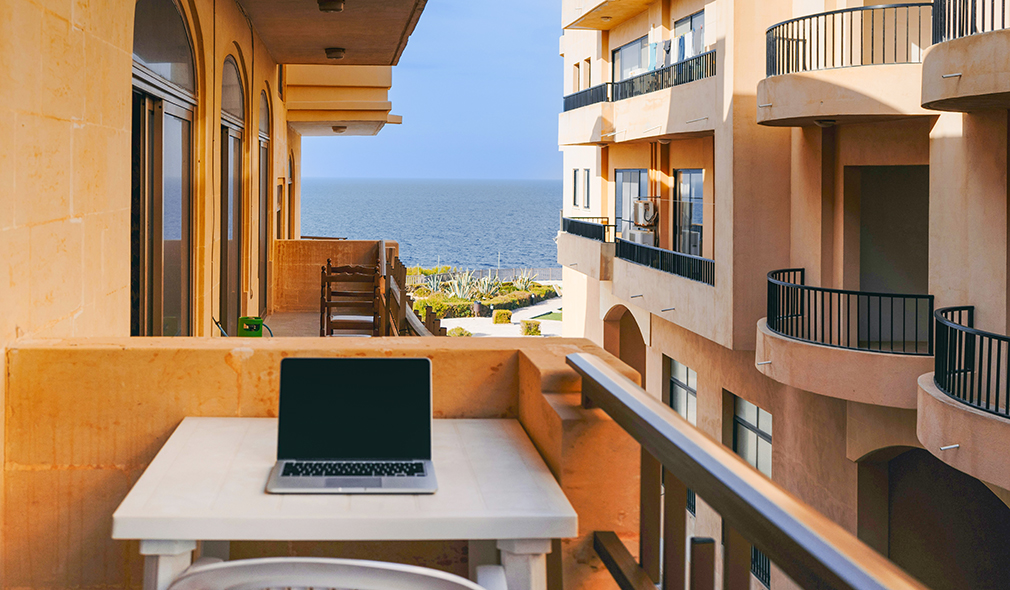Thinking of taking your remote work global this year? VisaGuide.World, a leading online guide to the world’s visa rules and requirements, recently released their 2024 Digital Nomad Visa Index. They based their ranking on factors like internet speed, taxation policies, income requirements, cost of living, quality of medical services, and destination popularity. In this article, we break down each of the nomad visas that landed on their list, supply you with the latest information about each visa’s application process and requirements, and ultimately make it just a little bit easier for you to decide which of these digital nomad visas might actually be for you.
Spain
While Spain is better known for its afternoon snooze, bullfights, tapas bars, and copious coastlines, it’s also home to the best digital nomad visa on the planet according to VisaGuide.World’s latest ranking. If you meet all of the requirements for Spain’s Digital Nomad Visa, you could potentially live and work remotely from Spain for up to five years. With this visa, you’re also permitted to find work in Spain as long as 80% of your overall earned income is from sources outside of Spain.
Quick Facts
- Visa Length: 1 year with options to renew and extend for up to 5 years
- Minimum Income Requirements: at least 200% of the monthly Spanish national minimum wage (approximately $2,600 per month or $32,000 per year)
- Application Fee: fee varies by country, but typically around €80 (about $85)
- Visa Turnaround Time: 15-45 days
- Income Tax Requirements: a reduced rate of 15% for the first four years of living in Spain, then the standard resident rate of 24%
- Family Included: yes, with additional financial proof required (additional 75% of the minimum wage for first family member and 25% for each family member after that)

Argentina
Argentina has welcomed digital nomads with open arms and mouthwatering asados since May 2022. While they’re still working out the finer details of their relatively new Digital Nomad Visa, the current requirements make this one of the easiest nomad visas in the world to attain, as long as you’re from a country that doesn’t require a tourist visa to visit (check if that’s you here). With no current minimum income thresholds specified, this digital nomad visa is not only accessible but also grants you access to a rather affordable South American home base. The cost of living can be anywhere between $600 and $2,000 per month and the range of landscapes and locations to call home is almost overwhelming, from big-city Buenos Aires to beachfront Mar del Plata, outdoorsy Bariloche, mother-of-Malbec Mendoza, and the Antarctic gateway city of Ushuaia.
Quick Facts
- Visa Length: 180 days, with the option to renew for an additional 180 days
- Minimum Income Requirements: undefined at this time, but safe to estimate a monthly income of $2500 per month is sufficient
- Application Fee: $200 total ($120 visa application fee and $80 consulate fee)
- Visa Turnaround Time: 10 to 45 days
- Income Tax Requirements: exempt
- Family Included: no

Romania
Romania’s long-stay visa encompasses digital nomads, allowing those with proof of remote working capabilities and a sustainable income to stay in Romania for up to two years. With some of the fastest internet in the Balkans, a riveting cultural and natural landscape, and the ability to still call itself an emerging destination, this just might be the hidden gem buried in this list. It’s affordable, with an average cost of living at around $1,500 per month, and a digital nomad infrastructure already alive and well in cities like Bucharest, Cluj Napoca, and Timisoara. Expect more nomad hubs to follow as digital nomads catch on to Romania’s underrated allure.
Quick Facts
- Visa Length: one year, with the option to renew for one additional year
- Minimum Income Requirements: at least three times the average gross monthly salary in Romania (roughly $5000 per month)
- Application Fee: unknown at this time, but likely low
- Visa Turnaround Time: two to three weeks
- Income Tax Requirements: exempt
- Family Included: no
United Arab Emirates
While the cost and requirements for entry are some of the loftiest on this list, the United Arab Emirates’ Virtual Work Residency Visa has its advantages, especially concerning taxes. Once you’ve spent more than 183 days in the country, you’re eligible to become a tax resident of the UAE and therefore can enjoy the benefits of the UAE’s zero income tax policy. The UAE is also famous for its Free Zones, special economic zones that offer import and customs benefits to entrepreneurs regardless of their country of origin. While the application process to hold an Emirates ID in your hands is lengthy and expensive (expect to pay upwards of $600 when it’s all said and done), it’s worth it for the UAE’s safety and quality of life, banking and digital infrastructure, state-of-the-art medical facilities, global networking opportunities, and tax-free income benefits.
Quick Facts
- Visa Length: one year, with the option to extend for one additional year
- Minimum Income Requirements: at least $3,500 per month
- Application Fee: 950 AED total (roughly $258)
- Visa Turnaround Time: 3-4 days, but the entire process can take 8-11 business days
- Income Tax Requirements: exempt
- Family Included: yes

Croatia
Like Spain, Croatia is another affordable country within the EU that has embraced the digital nomad visa concept. Croatia’s version of the digital nomad visa is their Temporary Stay Permit, which grants digital nomads temporary residence within Croatia for up to a year. Though the Temporary Stay Permit was only introduced as recently as early 2021, cities like Zagreb and Zadar already have a lively digital nomad infrastructure, brimming with coworking spaces, digital nomad community events, and even a digital nomad village.
Quick Facts
- Visa Length: up to 1 year with the possibility to reapply after 6 months have passed since its expiration
- Minimum Income Requirements: at least €2,870 per month or €34,400 per year (roughly $3,000 per month or $36,800 per year)
- Application Fee: €55.74 (about $60) if submitting at an embassy or consulate outside of Croatia, €46.45 (about $50) if submitting from within Croatia
- Visa Turnaround Time: anywhere from 3-4 weeks to 3-4 months
- Income Tax Requirements: exempt
- Family Included: yes
Portugal
Portugal offers a few different pathways for digital nomads to stay long-term in the land of Fado, ceramic tile-coated buildings, and custard tarts. The Temporary Stay Visa is good for one year and allows for multiple entries into Portugal. It’s unclear whether renewal is possible. Alternatively, you can apply for a Temporary Residence Permit by first getting the Residency Visa, a four-month, two-entry visa designed to span the length of time it takes for you to receive your Temporary Residence Permit. This longer-stay permit is good for two years and is renewable for another three years, putting you at the five-year threshold of eligibility to apply for citizenship if you wish.
Quick Facts
- Visa Length: up to one year for the Temporary Stay Visa and up to two years for the Temporary Residence Permit with the option to extend for an additional three
- Minimum Income Requirements: at least four times the monthly Portuguese minimum wage (roughly $3500 per month)
- Application Fee: ranges between €75 and €90
- Visa Turnaround Time: 3-4 months
- Income Tax Requirements: yes, dependent on your income (expect somewhere between 14.5% and 45%)
- Family Included: yes
Uruguay
Recently launched in May of 2023, Uruguay’s 180-day nomad visa, or the Provisional Identity Card as it’s officially called, is another one of the most accessible visas on this list. There are no minimum income requirements, the application fee is around $10, and it can lead to permanent residency if you end up loving Uruguay too much leave. Should you go for it and want to maximize your day count, it’s suggested to enter Uruguay on the typical 90-day tourist permit and then apply for the digital nomad visa in-country and towards the end of your stay. All you’ll need to apply is a valid passport, proof of accommodation and income from non-Uruguayan sources, and a signed letter from your employer or client outlining your role and length of employment with them.
Quick Facts
- Visa Length: 180 days with the option to extend for an additional 180 days maximum
- Minimum Income Requirements: none
- Application Fee: around $10
- Visa Turnaround Time: 1 to 3 weeks
- Income Tax Requirements: exempt
- Family Included: no
Malta
Why not try on island life in Malta with their newly launched Nomad Residence Permit? Their version of the digital nomad visa allows you stay in the country for one year to start, and allows up to three additional renewals. Furthermore, as Malta is part of the Schengen Area, you also get visa-free travel in all other Schengen territories for the length of your stay, just be sure to spend at least five months of the year in Malta to maintain your eligibility for renewal. Besides its gorgeous Mediterranean location, Malta also has famously fast wifi, with 5G connection available pretty much everywhere.
Quick Facts
- Visa Length: one year, with the option to renew up to three times for a maximum stay of four years
- Minimum Income Requirements: at least €42,000 per year (roughly $44,700)
- Application Fee: €300 (roughly $310)
- Visa Turnaround Time: up to 30 days
- Income Tax Requirements: exempt for first 12 months, then 10%
- Family Included: yes

Norway
Norway’s Independent Contractor Visa allows you stay in Norway for up to two years, but it’s limited to those who are self-employed or freelancers. This is because part of what makes you eligible for Norway’s digital nomad visa is that you have at least one Norwegian client. If this doesn’t suit your line of remote work, another option is to head north to Svalbard, the archipelago midway between mainland Norway and the North Pole. In Svalbard, there are no visas or work permits required, just the assurance that you can support yourself financially and secure accommodation for yourself. Meet those requirements and you can actually stay for life if the Arctic temperatures and long, dark winters aren’t too much for you.
Quick Facts
- Visa Length: up to two years, renewable up to six years
- Minimum Income Requirements: at least €35,719 per year (roughly $38,000)
- Application Fee: NOK 6300 (roughly $570)
- Visa Turnaround Time: around 2 weeks
- Income Tax Requirements: yes, 22% after 183 days in Norway
- Family Included: yes, but they’ll need to apply for a work permit
Andorra
Nestled in the Pyrenees between Spain and France, Andorra recently extended their “liberal professional” visa to include digital nomads willing to spend at least 90 days in the country per year. While Andorra’s visa for digital nomadsrequires the added step of having your work approved by the Ministry of the Economy before you can even apply, it grants you legal residence in Andorra for two years to start. It can then be renewed for an additional two years, then three years at your second renewal, and 10 years for each consecutive renewal after that. That being said, it’s a pricey application at €2,500 followed by an additional fee of €500 for your residence card. Similar pricing ensues with each renewal. However, if the beauty and outdoor lifestyle of a mountain locale smushed between Spain and France, a highly affordable cost of living, and being on the frontier of a new digital nomad destination sounds appealing, Andorra might be for you. Just be sure to brush up on your Catalan, French, Spanish, and Portuguese, as English is not widely spoken.
Quick Facts
- Visa Length: two years, with options to renew in increments of two years, three years, and 10 years
- Minimum Income Requirements: at least 300% of the Andorran minimum monthly salary (roughly $4,400 per month)
- Application Fee: €2,500 (approximately $2,600)
- Visa Turnaround Time: within 15 business days
- Income Tax Requirements: yes, 10%
- Family Included: yes, with an additional 100% of the minimum salary per dependent









